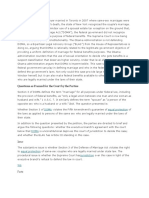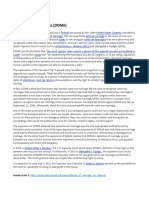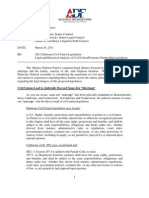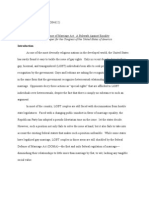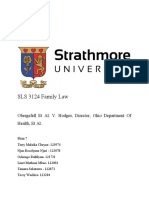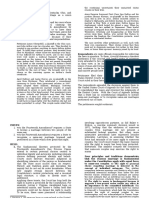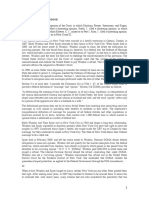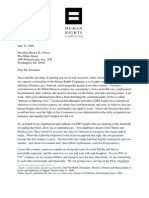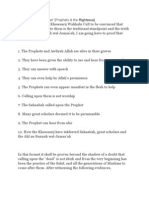Unidad 8 - FAMILIA ALUMNOS DOMA TEXTOS 3 y 4
Unidad 8 - FAMILIA ALUMNOS DOMA TEXTOS 3 y 4
Uploaded by
Julian Salonia BarnatanCopyright:
Available Formats
Unidad 8 - FAMILIA ALUMNOS DOMA TEXTOS 3 y 4
Unidad 8 - FAMILIA ALUMNOS DOMA TEXTOS 3 y 4
Uploaded by
Julian Salonia BarnatanOriginal Title
Copyright
Available Formats
Share this document
Did you find this document useful?
Is this content inappropriate?
Copyright:
Available Formats
Unidad 8 - FAMILIA ALUMNOS DOMA TEXTOS 3 y 4
Unidad 8 - FAMILIA ALUMNOS DOMA TEXTOS 3 y 4
Uploaded by
Julian Salonia BarnatanCopyright:
Available Formats
TEXTO 3:
https://www.law.cornell.edu/wex/defense_of_marriage_act_(doma)
Defense of Marriage Act (DOMA)
The Defense of Marriage Act (DOMA) was a federal law passed by the 104th United
States Congress intended to define and protect the institution of marriage. This law
specifically defined marriage as the union of one man and one woman which allowed
individual states to not recognize same-sex marriages that were performed and
recognized under other states’ laws. Nonetheless, this law's sections were ruled
unconstitutional by the United States Supreme Court in cases such as United States v.
Windsor (2013) and Obergefell v. Hodges (2015).
DOMA specifically stated that "the word 'spouse' refers only to a person of the
opposite sex who is a husband or a wife” and further states that “[i]n determining the
meaning of any Act of Congress, or of any ruling, regulation, or interpretation of the
various administrative bureaus and agencies of the United States, the word
'marriage' means only a legal union between one man and one woman as husband
and wife, and the word 'spouse' refers only to a person of the opposite sex who is a
husband or a wife.”
The implications of this law were that it denied many benefits and recognition
to same-sex couples that opposite-sex couples enjoyed. These benefits included but
were not limited to: over 1,000 federal protections and privileges such as access to a
spouse’s employment benefits, the recognition of the marriage itself, the rights
of inheritance, joint tax returns and exemptions, and the right to cohabit together in
a college or military housing.
In fact, DOMA authorized that states that banned same-sex marriage did not have to
recognize same-sex marriages that were performed in other states and further
specified that in regards to federal law, marriage is only between a man and a
woman. This law had overwhelming support within Congress while there was
speculation that Hawaii was going to soon recognize same-sex marriage, which could
force or prompt other states to recognize same-sex marriages that occurred in
Hawaii. President Bill Clinton signed DOMA into law on September 21, 1996.
Afterwards, about 40 states enacted specific bans on same-sex marriage.
One of the major provisions of this law was that a non-biological parent could not
have a legal relationship with a child of the biological parent in a same-sex couple.
Moreover, same-sex couples could not take medical leave to care for their partners
or non-biological children. They also could not adopt children and during divorce
Material didáctico alumnos: Unidad Familia
proceedings, they could not petition the court for custody, visitation rights, or child
support.
The supporters of DOMA believed that opposite-sex marriage was the only
appropriate method for family formation and procreation. One of the major
arguments from proponents of DOMA was that same-sex marriage could lead to
alternative family formations and could even result in incestuous relationships and
polygamous marriage. On the other hand, the opponents of DOMA claimed that
DOMA’s definition of marriage as only between one man and one woman and other
arguments were discriminatory on the basis of sex, and equated homosexuality with
incest and polygamy.
In 2013 in United States v. Windsor, the U.S. Supreme Court struck down DOMA’s
definition of marriage as only between one man and one woman. Furthermore, in
2015 in Obergefell v. Hodges, the Supreme Court struck down the section of DOMA
that allowed individual states to not recognize same-sex marriages performed in
other states. This result granted same-sex couples the constitutional right to marry.
It is important to note that in 2022, the Supreme Court decision in Dobbs v.
Jackson opened up the possibility for the Court to reexamine its ruling in Obergefell in
the future.
[Last updated in September of 2022 by the Wex Definitions Team]
Material didáctico alumnos: Unidad Familia
TEXTO 4:
https://www.lambdalegal.org/blog/what-is-doma-and-why-is-it-bad
What Is DOMA and Why Is It Bad?
By Jon W. Davidson,
Legal Director and Eden/Rushing Chair
NOVEMBER 27, 2012
Jon Jon W. Davidson, Legal Director W.
Davidson Legal Director Legal
OMA is the shortened name for the so-called Defense of Marriage Act. DOMA is a federal
law that was passed by Congress and signed by President Clinton in 1996, in response
to the marriage equality litigation in Hawaii in which Lambda Legal was co-counsel. Some
members of Congress were worried that, if same-sex couples won the right to marry in
Hawaii, the federal government and other states might have to start honoring those
marriages. They passed DOMA in an effort to prevent that.
There are two main parts of the law: Section 2 of DOMA says that Congress believes
other states should be able to ignore marriages lawfully entered by same-sex couples,
and treat those legally-married couples as strangers to one another. Section 3 of DOMA
says that the federal government does not have to recognize or honor those marriages.
DOMA does not prohibit states from allowing same-sex couples to marry—it only
addresses the consequences of those marriages for purposes of other states' laws or
federal laws.
Whether or not the federal government recognizes the marriages of same-sex couples
can be very important in their lives. A General Accounting Office report looked at all
federal statutes and found 1,138 federal laws using terms like “spouse,” “husband,”
“wife,” “widow” or “widower,” that treat people differently based on whether or not the
federal government recognizes them as married. As a result of DOMA, married same-
sex couples are denied things like:
• health insurance and pension protections for federal employees' spouses
• social security benefits for widows and widowers
• support and benefits for military spouses
• joint income tax filing and exemption from federal estate taxes
• immigration protections for binational couples
Material didáctico alumnos: Unidad Familia
Furthermore, one of the most basic things that spouses often provide for each other is
access to workplace health benefits. Many employers do provide equal access to health
benefits to the spouses of all their employees—different sex and same-sex alike. But
because the federal government does not recognize the marriages of same-sex couples,
lesbian and gay employees who sign their spouses up for health insurance must pay
income taxes on the amount of the premium as if that were part of their paycheck.
Different-sex couples whose employers provide family health care coverage can enroll
in that coverage tax-free.
Beyond all those tangible things, it's very upsetting to couples who are legally married to
have their federal government completely disregard their marriages and families. And
the message it sends to others compounds the damage—if the federal government says
same-sex couples aren’t really married, then others may believe they can be equally
disrespectful of same-sex couples’ relationships and of lesbians and gay men in general.
Lambda Legal won’t give up until DOMA is defeated once and for all. The damage it
causes for our families must end. We are waiting to learn whether the U.S. Supreme
Court will hear our case representing Karen Golinski, who is fighting for family health
insurance that equally covers her spouse. If the Supreme Court takes our case (or one of
three others), we will work together to strike this discriminatory law from the books once
and for all.
READ a Summary of the case: https://www.casebriefs.com/blog/law/constitutional-law/constitutional-
law-keyed-to-brest/liberty-equality-and-fundamental-rights-the-constitution-the-family-and-the-body/united-
states-v-windsor/
Material didáctico alumnos: Unidad Familia
You might also like
- Index Degree 12 Part 2 - Monographs 101-200Document42 pagesIndex Degree 12 Part 2 - Monographs 101-200Sauron38667% (6)
- Fundamentals of Entrepreneurship: © Oxford Fajar Sdn. Bhd. (008974-T), 2013 1 - 1Document43 pagesFundamentals of Entrepreneurship: © Oxford Fajar Sdn. Bhd. (008974-T), 2013 1 - 1SofeaNo ratings yet
- Dreams and Their Homoeopathic Medicines-SIVARAMANDocument26 pagesDreams and Their Homoeopathic Medicines-SIVARAMANatuguesp67% (3)
- Edith Windsor and Thea Spyer Married in Toronto in 2007 Where SameDocument9 pagesEdith Windsor and Thea Spyer Married in Toronto in 2007 Where SameAndreo Miguel H. ZamoraNo ratings yet
- Gender & Sexuality Essay Edited, Eng 1121Document7 pagesGender & Sexuality Essay Edited, Eng 1121api-284318907No ratings yet
- Us Vs Windsor DigestDocument2 pagesUs Vs Windsor DigestMashima TaichiNo ratings yet
- Wolfson TestimonyDocument8 pagesWolfson TestimonyCatherine SnowNo ratings yet
- Unidad FamiliaDocument20 pagesUnidad FamiliaPaau MangioneNo ratings yet
- US Vs Windsor DigestDocument3 pagesUS Vs Windsor DigestJomar TenezaNo ratings yet
- Marriage Equality AmendmentDocument4 pagesMarriage Equality AmendmentFelicity WilkinsonNo ratings yet
- Comment On Recent Mass. and Cal. Cases On Same-Sex MarriageDocument7 pagesComment On Recent Mass. and Cal. Cases On Same-Sex Marriagepsullivan0513No ratings yet
- Same Sex MarriageDocument19 pagesSame Sex Marriagewinstonking67% (3)
- Civil Unions Lead To Judicially Decreed Same-Sex "Marriage"Document7 pagesCivil Unions Lead To Judicially Decreed Same-Sex "Marriage"G-A-YNo ratings yet
- Obergefell Vs HodgesDocument4 pagesObergefell Vs HodgesAnonymous AUdGvY100% (1)
- Fs - Civil Unions Are Not EnoughDocument2 pagesFs - Civil Unions Are Not EnoughAxelNo ratings yet
- Gay Marriage Essay 4Document7 pagesGay Marriage Essay 4emdrobNo ratings yet
- Obergefell v. Hodges Case Brief - Nate VolkerDocument4 pagesObergefell v. Hodges Case Brief - Nate VolkerNate VolkerNo ratings yet
- Family Law OutlineDocument18 pagesFamily Law OutlineBill TrecoNo ratings yet
- Obergefell VDocument3 pagesObergefell VZhaojiang XueNo ratings yet
- Jess Nguyen - Policy Paper 1Document9 pagesJess Nguyen - Policy Paper 1quarterback20015No ratings yet
- Position Paper For The Congress of The United States of AmericaDocument11 pagesPosition Paper For The Congress of The United States of Americapmusgr01No ratings yet
- Case Study 2Document5 pagesCase Study 2Terry CheyneNo ratings yet
- Same Sex MarriageDocument4 pagesSame Sex MarriagephoebelazNo ratings yet
- CburgettpaperDocument8 pagesCburgettpaperCody BurgettNo ratings yet
- Same Sex Marriage Paper Business EthicsDocument8 pagesSame Sex Marriage Paper Business Ethicsdunkman3No ratings yet
- PFR Notes For Class 18112021Document21 pagesPFR Notes For Class 18112021Noel PiadNo ratings yet
- Held: The Fourteenth Amendment Requires A State To License A Marriage Between TwoDocument6 pagesHeld: The Fourteenth Amendment Requires A State To License A Marriage Between TwoChrisel Joy Dela CruzNo ratings yet
- Complaint For Declaratory and Injunctive ReliefDocument21 pagesComplaint For Declaratory and Injunctive ReliefBilly ManesNo ratings yet
- Obergefell v. Hodges Facts of The CaseDocument4 pagesObergefell v. Hodges Facts of The CaseFe GregorioNo ratings yet
- Windsor OpinionDocument8 pagesWindsor OpinionAnonymous FFMoQLyNo ratings yet
- Classifying Arguments Activity-Answer Key: Obergefell v. Hodges (And Consolidated Cases)Document6 pagesClassifying Arguments Activity-Answer Key: Obergefell v. Hodges (And Consolidated Cases)zombielibraryNo ratings yet
- Affirmative Same Sex MarriageDocument17 pagesAffirmative Same Sex MarriageDoo RaNo ratings yet
- Christian EthicsDocument7 pagesChristian EthicsOlan Dave LachicaNo ratings yet
- Case #12 Goodridge v. Department of Public Health (2003) 440 Mass. 309Document5 pagesCase #12 Goodridge v. Department of Public Health (2003) 440 Mass. 309Norzahra G. DimatingkalNo ratings yet
- KENNEDY, J., Delivered The Opinion of The Court, in Which GINSBURG, BREYER, SOTOMAYOR, and KAGAN, JJ., JoinedDocument3 pagesKENNEDY, J., Delivered The Opinion of The Court, in Which GINSBURG, BREYER, SOTOMAYOR, and KAGAN, JJ., JoinedzeynNo ratings yet
- Equal Rights Trust Case Summary, Obergefell Et Al. V Hodges, Director, Ohio Department of Health, El Al. 576 USDocument4 pagesEqual Rights Trust Case Summary, Obergefell Et Al. V Hodges, Director, Ohio Department of Health, El Al. 576 USTammy YahNo ratings yet
- Due ProcessDocument112 pagesDue ProcessmeriiNo ratings yet
- Family Law ProjectDocument22 pagesFamily Law ProjectManu GuptaNo ratings yet
- Obergefell Vs Hodges DigestDocument2 pagesObergefell Vs Hodges DigestMPat EBarr67% (3)
- President Barack H. ObamaDocument4 pagesPresident Barack H. ObamapspauldNo ratings yet
- Denying Some People The Option To Marry Is Discriminatory and Creates A Second Class of CitizensDocument14 pagesDenying Some People The Option To Marry Is Discriminatory and Creates A Second Class of CitizensAldynanda B.SNo ratings yet
- Same-Sex Marriages: Legal Issues: Alison M. SmithDocument36 pagesSame-Sex Marriages: Legal Issues: Alison M. SmithyashNo ratings yet
- July 2015 Legal Affairs UpdateDocument8 pagesJuly 2015 Legal Affairs UpdateNOVA SHRMNo ratings yet
- United States District Court For The District of IdahoDocument26 pagesUnited States District Court For The District of IdahoEquality Case FilesNo ratings yet
- To: From:: FW: Recognizing Out-of-State, Same-Sex Marriages - A.G. Opinion AG - Opinion PDFDocument8 pagesTo: From:: FW: Recognizing Out-of-State, Same-Sex Marriages - A.G. Opinion AG - Opinion PDFEquality Case FilesNo ratings yet
- Obergefell Et Al. v. HodgesDocument2 pagesObergefell Et Al. v. HodgesClarebeth RamosNo ratings yet
- Same-Sex Marriage in Other Jurisdictions 3.1 Have Same-Sex Marriage Laws Been Enacted in Overseas Jurisdictions?Document9 pagesSame-Sex Marriage in Other Jurisdictions 3.1 Have Same-Sex Marriage Laws Been Enacted in Overseas Jurisdictions?Anonymous dYVMvSoYzVNo ratings yet
- Types of MarriageDocument4 pagesTypes of MarriageАлиса КэрроллNo ratings yet
- SC and Gay MarriageDocument3 pagesSC and Gay MarriageRat RoiNo ratings yet
- Equal Protection Under The LawDocument5 pagesEqual Protection Under The LawNina SmithNo ratings yet
- Obergefell v. HodgesDocument20 pagesObergefell v. HodgesPeeve Kaye BalbuenaNo ratings yet
- Gay MarriageDocument24 pagesGay MarriageRA MemijeNo ratings yet
- United States Court of Appeals For The Ninth CircuitDocument8 pagesUnited States Court of Appeals For The Ninth CircuitEquality Case FilesNo ratings yet
- BakerDocument10 pagesBakerCharmaine GraceNo ratings yet
- Latta v. Otter (Idaho Ruling)Document57 pagesLatta v. Otter (Idaho Ruling)jsnow489No ratings yet
- Geiger v. Kitzhaber Final Opinion Decision Oregon Gay MarriageDocument32 pagesGeiger v. Kitzhaber Final Opinion Decision Oregon Gay MarriageLaw Works LLCNo ratings yet
- 6:13-cv-01834 DecisionDocument26 pages6:13-cv-01834 DecisionEquality Case FilesNo ratings yet
- A Time to Embrace: Same-Sex Relationships in Religion, Law, and Politics, 2nd editionFrom EverandA Time to Embrace: Same-Sex Relationships in Religion, Law, and Politics, 2nd editionNo ratings yet
- Gale Researcher Guide for: Patterns of Intimate Partnership TerminationFrom EverandGale Researcher Guide for: Patterns of Intimate Partnership TerminationNo ratings yet
- Gale Researcher Guide for: The Legal, Social, and Emotional Definition of MarriageFrom EverandGale Researcher Guide for: The Legal, Social, and Emotional Definition of MarriageNo ratings yet
- The History of Abortion Legislation in the USA: Judicial History and Legislative ResponseFrom EverandThe History of Abortion Legislation in the USA: Judicial History and Legislative ResponseNo ratings yet
- Women vs. American Supreme Court: The History of Abortion LegislationFrom EverandWomen vs. American Supreme Court: The History of Abortion LegislationNo ratings yet
- Full Download True North Leading Authentically in Today S Workplace Emerging Leader Edition 3rd Edition Bill George & Zach Clayton PDFDocument49 pagesFull Download True North Leading Authentically in Today S Workplace Emerging Leader Edition 3rd Edition Bill George & Zach Clayton PDFfudakoduh100% (1)
- Assingment 2Document2 pagesAssingment 2Mubashir HussainNo ratings yet
- Down With Winchester: Too Much of A WasteDocument4 pagesDown With Winchester: Too Much of A WasteTiffany BouchardNo ratings yet
- Beethoven and His Others BFDocument40 pagesBeethoven and His Others BFIlija Atanasov100% (1)
- Example: (Memory Management)Document2 pagesExample: (Memory Management)Aman BazeNo ratings yet
- Ralickas CosmicHorrorQuestion 2007Document36 pagesRalickas CosmicHorrorQuestion 2007ludovico.stellaNo ratings yet
- Domestic Vacations: Julie BlackmonDocument6 pagesDomestic Vacations: Julie BlackmonlunagnarcoNo ratings yet
- Subiect Bilingv 2024Document2 pagesSubiect Bilingv 2024Daniela RotaruNo ratings yet
- Hero - Enrique IglesiasDocument3 pagesHero - Enrique IglesiasreidpauNo ratings yet
- Errors in The Use of Verb FormsDocument35 pagesErrors in The Use of Verb FormsWahyuddin MahmudNo ratings yet
- Kwok Vs PCMCDocument2 pagesKwok Vs PCMCAnn Alejo-Dela TorreNo ratings yet
- Responsibilities of A LawyerDocument15 pagesResponsibilities of A Lawyerryan kibosh100% (1)
- Cannibalism By: Bill Schutt I. Most People Consider Cannibalism Appalling and Unnatural, But Research Shows It's Quite NaturalDocument7 pagesCannibalism By: Bill Schutt I. Most People Consider Cannibalism Appalling and Unnatural, But Research Shows It's Quite NaturalDimas Farayndra PranidhanaNo ratings yet
- Engg Grad Held For Techie Murder at Chennai Station: Humorist Gets 3 Phds After Failing Class 11 & 12Document1 pageEngg Grad Held For Techie Murder at Chennai Station: Humorist Gets 3 Phds After Failing Class 11 & 12Robert JhonNo ratings yet
- Joketsuzoku Chinese Amazons R.C.C.Document8 pagesJoketsuzoku Chinese Amazons R.C.C.Strider KageNo ratings yet
- Play Date by ReinsabiilaDocument377 pagesPlay Date by ReinsabiilaWiwied OctavianyNo ratings yet
- Calling Upon The "Dead" (Prophets & The Righteous)Document29 pagesCalling Upon The "Dead" (Prophets & The Righteous)Faheem Muhammad Chishti FCNo ratings yet
- Skin Hair and NailsDocument2 pagesSkin Hair and NailsJL RebeseNo ratings yet
- Herberts The CollarDocument8 pagesHerberts The CollarSudeshna bharNo ratings yet
- 1 17 Making An OutlineDocument12 pages1 17 Making An Outlineapi-255604476No ratings yet
- Pinomatik Çift Kumanda Bloğu Operating InstructionDocument64 pagesPinomatik Çift Kumanda Bloğu Operating InstructionSüleymanŞentürkNo ratings yet
- Advanced PWM Techniques For Control of Power Electronic Converters in PV and Motor Drive SystemsDocument21 pagesAdvanced PWM Techniques For Control of Power Electronic Converters in PV and Motor Drive SystemsAman MalikNo ratings yet
- I533-E1-04 SmartStep User - ManualDocument251 pagesI533-E1-04 SmartStep User - ManualkukaNo ratings yet
- Chap4 CALCULATIONS USED IN ANALYTICAL CHEMISTRYDocument20 pagesChap4 CALCULATIONS USED IN ANALYTICAL CHEMISTRYDave Marimon100% (1)
- (Comparative and international education (Sense Publishers) 41) Accioly, Inny_Leher, Roberto - Commodifying education_ theoretical and methodological aspects of financialization of education policiesDocument141 pages(Comparative and international education (Sense Publishers) 41) Accioly, Inny_Leher, Roberto - Commodifying education_ theoretical and methodological aspects of financialization of education policiesAlexandre BrasilNo ratings yet
- LKPD Narative TEXT MEET 1Document5 pagesLKPD Narative TEXT MEET 1Marseli PuspawatiNo ratings yet
- Phân Phối Chương Trình Làm Quen Tiếng Anh Mầm Non Lớp Lá - Isee KidsDocument25 pagesPhân Phối Chương Trình Làm Quen Tiếng Anh Mầm Non Lớp Lá - Isee KidsNu-S NguyễnNo ratings yet



